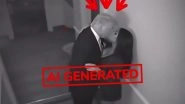New Delhi, Nov 5 (PTI) The CBIC has come out with guidelines on blocking of tax credit by GST field officers, saying that such blocking should be on the basis of 'material evidence' and not just out of 'suspicion'.
The guidelines laid down five specific circumstances in which such credit could be blocked by a senior tax officer. These include availment of credit without any invoice or any valid document, or availing of credit by purchasers on invoices on which GST has not been paid by sellers.
Also Read | Kerala Man Orders Pouch Online, Receives Original Passport Along with Cover.
The Central Board of Indirect Taxes and Customs (CBIC) said the commissioner, or an officer authorised by him, not below the rank of assistant commissioner, must form an opinion for blocking of input tax credit (ITC) only after "proper application of mind" considering all the facts of the case.
"It is reiterated that the power of disallowing debit of amount from electronic credit ledger must not be exercised in a mechanical manner and careful examination of all the facts of the case is important to determine cases(s) fit for exercising power under rules 86A," it said.
The government had introduced Rule 86A in GST rules in December 2019 giving powers to taxmen to block the ITC available in the electronic credit ledger of a taxpayer if the officer has "reasons to believe" that the ITC was availed fraudulently.
Till early last month, taxmen had blocked Rs 14,000 crore worth of input tax credit (ITC) of 66,000 businesses under this rule.
The CBIC in its guidelines dates November 2 said the remedy of disallowing debit of amount from electronic credit ledger being, by its nature, extraordinary, has to be resorted to with utmost circumspection and with maximum care and caution.
It contemplates an objective determination based on intelligent care and evaluation as distinguished from a purely subjective consideration of suspicion.
The reasons are to be on the basis of material evidence available or gathered in relation to fraudulent availment of input tax credit or ineligible input tax credit availed as per the conditions/grounds under sub-rule (1) of Rule 86A.
These guidelines have recommended monetary limits for the division of powers between commissions, joint commissioners, and assistant commissioners on blocking of the tax credit.
For blocking of ITC above Rs 5 crore, principal commissioner/ commissioner will take a decision. Where the monetary amount is in the range of Rs 1-5 crore, additional commissioner or joint commissioner will take a decision, while for those less than Rs 1 crore deputy commissioner/ assistant commissioner rank officer will take decision on ITC blocking.
AMRG & Associates Senior Partner Rajat Mohan said, "If these broad guidelines are followed by central as well as state tax officers in letter and spirit, these will surely reduce the litigation for honest taxpayers who are currently facing harassment at the hands of tax officers." HRS hrs
(The above story is verified and authored by Press Trust of India (PTI) staff. PTI, India’s premier news agency, employs more than 400 journalists and 500 stringers to cover almost every district and small town in India.. The views appearing in the above post do not reflect the opinions of LatestLY)













 Quickly
Quickly


